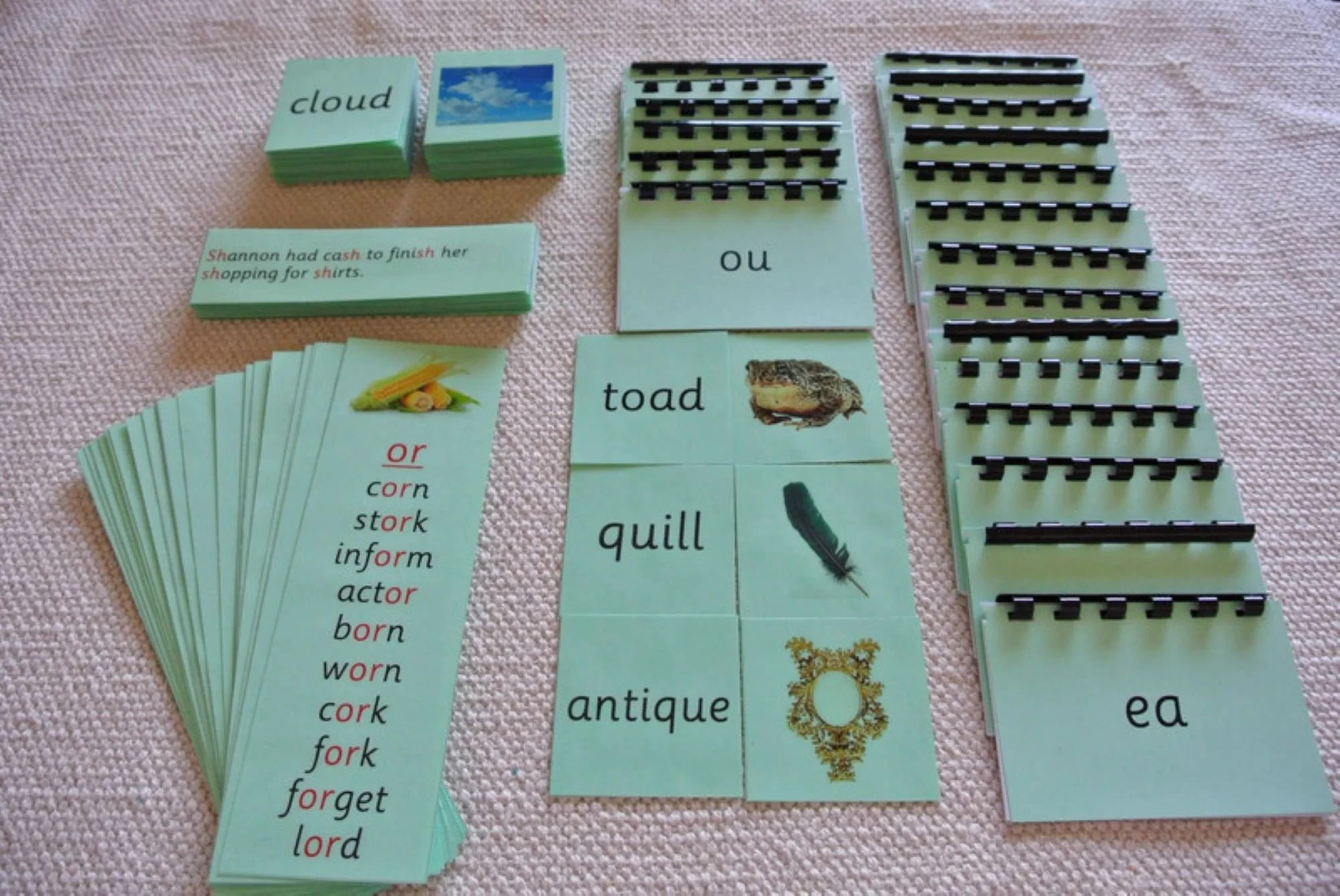This Montessori language lesson is designed for 6-12 year old children as they move to more advance learning.
After exploring the wonders of the pink series and blue series, the green series is the final stage of the Montessori language journey. The Green Series in Montessori is a crucial step in a child’s reading journey.
By mastering the sounds of two-letter combinations, children develop the foundational skills needed for natural reading. Let’s see how the Green Series helps children become better readers.
What is the Green Series?
It is an essential part of the series within the Montessori course that introduces the child to phonemic awareness. Phonograms combine to express a specific sound through letters. There are 16 such phonograms presented in green sandpaper letters in the Montessori classroom.
Examples of phonograms would be “ee,” “oa,” “ai,” “oy,” and “th.” Mastering these phonograms gives a child very strong independence to decode the words and hence read..
Why is the Green Series Important?
The Green Series introduces phonemic awareness to the child, thus enabling them to recognize and manipulate individual sounds of the words. Mastering the phonograms makes it easier for the child to decode the words.
This means they are able to sound out unfamiliar words, read for meaning. A solid foundation in phonemic awareness and decoding skills also produces an improvement in reading fluency. Understanding phonograms also enables children to spell better.
They can spell the words correctly because of the ability to use knowledge about letter-sound relationships.
What is the purpose of the Green Series?
The Green Series in Montessori education serves as a crucial foundation for developing literacy skills in children. The Green Series contributes to overall language development. Children learn new vocabulary words and improve their understanding of language structure.
- Builds a strong foundation for reading.
- Enhances communication skills.
- Stimulates cognitive development.
- Fosters a love of learning.
- Vocabulary Growth.
- Improved Listening Skills.
Using the Green Series- A Guide for Parents and Teachers
The Green Series forms a core part of the Montessori curriculum for 3-6-year-old children. It is an important step in making the child phonemically aware, which is one of the essential literacy skills.
The Pink and Blue Series cater more to the orientation of practical life and practical sensorial activities. The Green Series exposes the child to the world in which they start conversing with language and sounds.
Phonemic Awareness
Phonemic awareness is central to literacy, especially in processing reading and writing. Phonemic awareness entails the ability of the interlocutor to recognise and manipulate individual sounds in words.
In that case, phonemic awareness is a strong background in the decoding of words through the perceptional exercise realised from a glance between sounds and letters. The skills include –
- Sound isolation- – This is finding a word’s exact sound. The word “cat” would be /k/, /a/, and /t/. Have the child tell you what the first sound in the word “dog” is or what the last sound is in the word “hat.”
- Sound blending- This is the skill whereby individual sounds are blended to form a whole word. Say /s/, /n/,/a/ and /p/ individually and ask the child to blend them into “snap.”
- Sound deletion- This is the process whereby a sound is deleted in a word and a new word formed. Say the word “bat” and then ask the child to say the word without the /b/ sound.
- Sound substitution- This is the ability to substitute one sound in a word with another sound to make a different word. Ask the child to say the word “cat,” then substitute the /k/ sound at the beginning to make a /d/ sound to form the word “dat.”
Phonological Awareness
Phonological awareness is a broader concept and is responsible for all phonemic awareness behaviour along with other sound structures of language. It equips the children with a better understanding of language structure and helps them home their language in totality. It consists of
- Syllable awareness – The awareness of the child while speaking or listening to a word, to realize the number of separate parts or “beats” of a word. For example, make the child clap for a once each in each syllable of the word, “elephant.”.
- Rhyming- This involves the identification of words that have the same final sounds. Ask the child to provide words that rhyme with “hat” like “cat,” “mat,” and “bat.”
- Alliteration-This refers to the identification of words beginning with similar initial consonant sounds. Ask a child to give animal names beginning with /s/ like “snake, squirrel, shark, etc.
Vocabulary Expansion
Vocabulary enrichment means increasing the child’s knowledge of words. More vocabulary helps children to think clearly and communicate with clarity. Vocabulary enrichment aids cognitive development by enhancing one’s ability in problem-solving, critical thinking, and abstract reasoning. It includes-
- Introduce new words– Introduce children with new words through reading, conversations, and activities. Introduce various books with different sets of words to the children. Talk on topics that children can learn new words and concepts. Label and identify objects at home class or in community to introduce them with new vocabulary. Organize field trips so that children learn new words and concepts.
- Define and explain– Clearly define new words in a way the children can understand, with the use of pictures or diagrams to explain what they mean, or gestures to clarify meanings. Provide examples of the words in sentences to help the children know meaning and usage.
- Using new words in context- Assigning new words to sentences and the conversations to make the children understand how they have to use them and their meaning. Playing word games with the child like scrabble or pictionary involves the use of new words.
- Word play encouragement- Engaging a child in an activity that can ensure word plays and creativity like rhyming, making stories and word games. Let children make up their own stories using new vocabulary.
Do you know, Maria Montessori believed that all children are born with mathematical minds.
Reading Preparation
The Green Series provides the very foundation for future reading success by developing fundamental language skills, including phonemic awareness. Ample background in phonemic awareness is necessary for decoding words as well as understanding the relationship between sounds and letters.
- Phonological awareness – The knowledge of how the sounds are structured together forms the backbone of the language. Mastering these sound patterns aids in decoding. Vocabulary- Strong vocabulary will give students the wherewithal to communicate their ideas comprehensively and expansively.
- Oral language skills- Forming good oral language skills in listening, speaking, and telling stories lays a firm foundation for reading comprehension and expression.
Materials Used in the Green Series
- Sandpaper Letters- These are specially designed letters with sandpaper surfaces that help children associate sounds with visual representations.
- Phonogram Cards- These cards contain phonograms (letter combinations that represent a single sound), such as “ee,” “oa,” “ai,” “oy,” and “th.”
- Small Objects- These objects are used to represent sounds and help children visualise the relationship between sounds and letters.
Activities to Make Learning Fun
Learning should be an adventure! The following are some engaging activities to make the Green Series more fun..
- Read Aloud- Read books regularly to the child and discuss with him the story, characters, and vocabulary.
- Sing Songs– Sing songs and nursery rhymes together to reinforce phonemic awareness and vocabulary.
- Sound Games– Games to identify and manipulate sounds in words
- Label Objects – The teacher labels the objects around the classroom and the parents label the objects around the house to help the child link the words to visual representations.
- Rich Language Environment– Rich language materials such as books, magazines, educational toys, and so on surround the child.
- Storytelling- Encourage children to tell stories or retell favourite books.
- Encourage Language Use – Talk and discuss with the child on different topics.
- Model Good Listening Skills- Display active listening by first paying attention to a child’s speech and then responding reflectively.
Final Thoughts
The Green Series forms the most critical stage in Montessori education, which allows children to have a strong foundation for further learning. Focusing on phonemic and phonological awareness, vocabulary expansion, and oral language skills, the Green Series sets a child ready for tackling the challenges that will arise with reading and writing.
When supporting the learning of the child at the Green Series level, parents and teachers take the first steps toward the growth of a lifelong, educative base for the child’s success.

